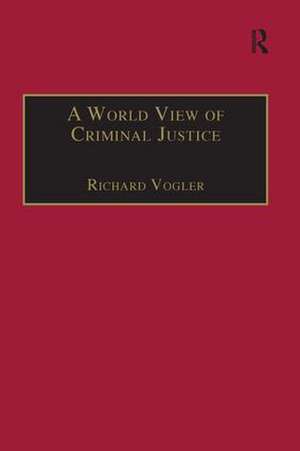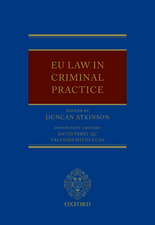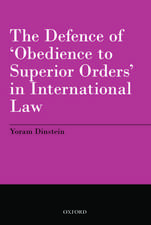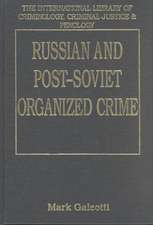A World View of Criminal Justice: International and Comparative Criminal Justice
Autor Richard Vogleren Limba Engleză Paperback – 9 sep 2016
| Toate formatele și edițiile | Preț | Express |
|---|---|---|
| Paperback (1) | 324.16 lei 6-8 săpt. | |
| Taylor & Francis – 9 sep 2016 | 324.16 lei 6-8 săpt. | |
| Hardback (1) | 770.45 lei 6-8 săpt. | |
| Taylor & Francis – 28 oct 2005 | 770.45 lei 6-8 săpt. |
Preț: 324.16 lei
Preț vechi: 424.53 lei
-24% Nou
Puncte Express: 486
Preț estimativ în valută:
62.03€ • 64.76$ • 51.34£
62.03€ • 64.76$ • 51.34£
Carte tipărită la comandă
Livrare economică 04-18 aprilie
Preluare comenzi: 021 569.72.76
Specificații
ISBN-13: 9781138248946
ISBN-10: 1138248940
Pagini: 344
Dimensiuni: 156 x 234 x 23 mm
Greutate: 0.45 kg
Ediția:1
Editura: Taylor & Francis
Colecția Routledge
Seria International and Comparative Criminal Justice
Locul publicării:Oxford, United Kingdom
ISBN-10: 1138248940
Pagini: 344
Dimensiuni: 156 x 234 x 23 mm
Greutate: 0.45 kg
Ediția:1
Editura: Taylor & Francis
Colecția Routledge
Seria International and Comparative Criminal Justice
Locul publicării:Oxford, United Kingdom
Cuprins
Contents: Preface; Understanding criminal process: a three-dimensional world view. Part I The Inquisitorial Tradition: The European inquisitorial tradition; The French revolution in criminal justice; Regimes of terror: inquisition-process in the 20th Century; Maoism and the Chinese inquisitorial tradition; Islamic criminal justice: theocratic inquisitoriality. Part II The Adversarial Tradition: The Anglo-American adversarial tradition; The great due process revolution: adversariality in Europe and Latin America; Adversariality and the collapse of 'Socialist Legality'. Part III The Popular Justice Tradition: Origins of the English jury; Juries originating in the British overseas empire; The European Jury; Direct popular participation: village courts and popular tribunals; Criminal justice reform; Bibliography; Index.
Notă biografică
Richard Vogler is Senior Lecturer in the Sussex Law School at the University of Sussex, UK.
Recenzii
'...Richard Vogler has done a double service to the advancement of the study of comparative criminal procedure. First he has engaged in enormous comparative scholarship in assembling in one book sketches of the histories of criminal procedure not only in his native England, Continental Europe and the US...but also in the Islamic world, China and the vast areas of the so-called Third World which were subjugated by the colonial powers. Secondly, he has offered a fresh three-pronged theoretical analysis of the dominant legal systems in the world today...' Professor Stephen Thaman, Saint Louis University School of Law, Saint Louis, USA 'The book impresses by the command the author displays of a mass of pertinent information, and his ability to draw together the main strands to form a coherent picture...This book should go far.' International Criminal Law Review '...an amazing treatise on the history and background of modern criminal procedure...[Vogler] presents a very well researched and appealing analysis of the criminal process and its reform tendencies from the middle ages until today...He has provided a brilliant sourcebook on comparative criminal procedure and a fresh, differentiated, yet consistent theoretical approach to comparing criminal justice systems.' Criminal Law Forum 'This book...serves a good contribution to the framework of comparative criminal justice systems and the presentation of different ideologies.' Contemporary Journal of International Criminal Law 'This is an excellent book and one that should be on the shelves of all interested in the development of criminal processes throughout the world.' British Society of Criminology
Descriere
In an era of unprecedented change in criminal justice around the world, our failure to take procedure seriously has a terrible cost, allowing reform to be driven by purely pragmatic considerations, cost-cutting or foreign influence. This book proposes a new theory of procedure derived from the three great international trial modes of 'inquisitorial justice', 'adversarial justice' and 'popular justice'.






























